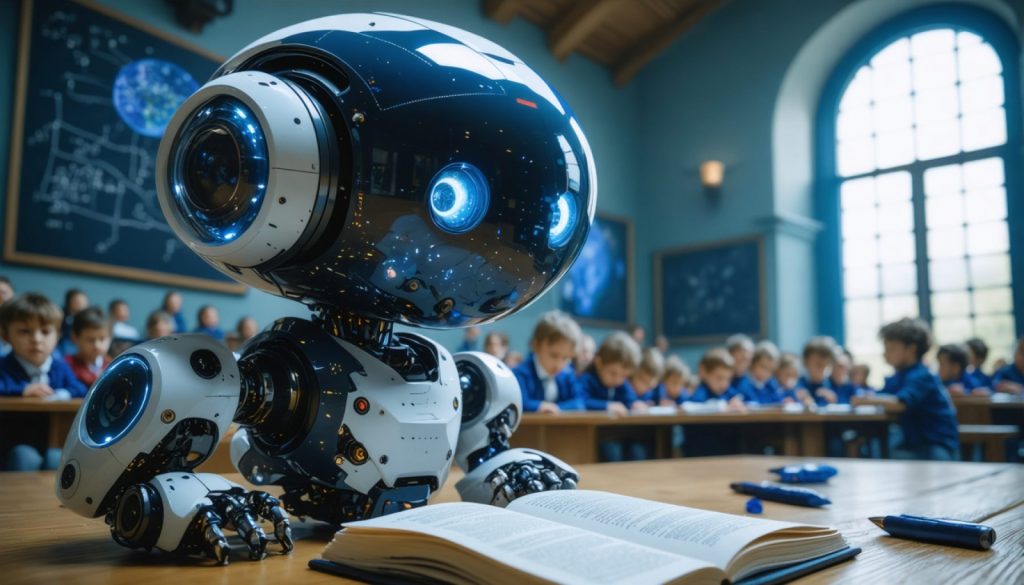
- Nearly 300 language education professionals from 25 countries gathered in Malta, focusing on the transformative impact of artificial intelligence (AI) in education.
- Hosted by the European Association for Quality Language Services (Eaquals), the conference emphasized AI as a tool to enhance teaching methodologies and tackle educational challenges.
- AI solutions discussed included automating administrative tasks and gamifying language learning, sparking optimism among educators for future integration.
- Sessions addressed significant topics such as adapting the Common European Framework of Reference for Languages (CEFR), gender identities, and embedding diversity, equity, and inclusion (DEI) in curriculums.
- Speakers like Meri Maroutian and Zarina Subhan advocated for confronting systemic biases and implementing meaningful DEI practices in education.
- The conference emphasized the educators’ mission to embrace technology and intercultural understanding to foster a more connected world.
Under the luminous Maltese skies, nearly 300 language education professionals converged from 25 countries, bearing witness to an emerging force reshaping their classrooms: artificial intelligence. No longer a distant dream, AI sparked fervent discussions, its transformative potential echoing through the conference halls like a clarion call for educators ready to embrace change.
The European Association for Quality Language Services (Eaquals) took the helm of this gathering, with Executive Director Lou McLaughlin emphasizing AI as a crucial focus. For Eaquals’ assorted institutions, this revolutionary technology presents a tapestry of possibilities—and challenges. Attendees immersed themselves in AI-driven solutions, exploring everything from automating administrative burdens to gamifying the intricacies of language learning.
In an era where technology reimagines educational landscapes, a sense of optimism prevailed. McLaughlin conveyed confidence in an industry renowned for agility and resilience, proposing AI as a tool to enhance existing methodologies. Similarly, Thom Kiddle, chair of Eaquals’ board of trustees, likened AI’s introduction to previous paradigm shifts like online and mobile learning. Recognizing the questions to ask in this critical moment is half the battle, he noted, as educators globally unite in tackling what some perceive as an existential challenge.
Malta’s conference was a beacon of camaraderie and innovation, warmed by new faces eager to contribute to the dialogue. Eaquals’ commitment to inclusivity, welcoming non-members, creates a reflective mirror revealing the organization’s progress and fostering a diverse exchange of ideas.
Beyond AI, sessions delved into adapting the Common European Framework of Reference for Languages (CEFR), addressing gender identities, and embedding diversity, equity, and inclusion into curriculums. Educator Meri Maroutian’s poignant session challenged the audience to face systemic biases within English language teaching. Despite advancements, she highlighted, institutions often value native-speaker status over competence—a bias that demands reform. Her rallying cry urged a reevaluation of hiring practices, advocating for equity for non-native teachers who are frequently overqualified yet underappreciated.
Further enriching the discourse, Zarina Subhan delivered a stern reminder against superficial DEI initiatives. Her call for genuine integration of inclusive practices urged educators to transform beyond perfunctory efforts and engage meaningfully in fostering diverse learning environments.
As Eaquals looks to Berlin for its next congregation in 2026, the Maltese meeting leaves a lasting legacy. It underscores the critical role of educators at the forefront of cultivating intercultural understanding, armed with AI—not as a mere tool, but as a companion in nurturing a more connected world. In an era where borders blur and language binds us, the educators’ mission is clear: embrace the future, one word at a time.
Unleashing AI’s Potential in Language Education: Transformative Prospects and Practical Applications
The recent gathering under the luminous Maltese skies was more than just a conference; it was a testament to the evolving role of artificial intelligence (AI) in reshaping the landscape of language education. Attended by nearly 300 language education professionals from 25 countries, the event highlighted the transformative potential of AI, which is no longer a distant dream but a reality impacting classrooms worldwide. Spearheaded by the European Association for Quality Language Services (Eaquals), this conference underscored both the possibilities AI brings and the challenges it presents.
AI as a Game-Changer in Language Education
AI has the potential to revolutionize language education in multiple ways:
– Automation: AI can significantly reduce administrative burdens, giving educators more time to focus on teaching. Systems can automate tasks like record-keeping, scheduling, and grading, enhancing efficiency.
– Personalized Learning: AI enables the personalization of learning experiences. Through adaptive learning technologies, AI can tailor lessons to meet individual student needs, accommodating different learning paces and styles.
– Gamification: The integration of AI in gamifying education makes learning more engaging. This can improve student motivation and retention, especially in language education where practice and repetition are crucial.
Addressing Systemic Biases and DEI
The conference also ventured beyond AI, tackling systemic issues such as bias in English language teaching. Educator Meri Maroutian’s session drew attention to the often-preferred native-speaker bias, urging a shift toward equity for qualified non-native teachers. Similarly, Zarina Subhan’s appeal for genuine DEI integration stressed the importance of embracing diversity over superficial efforts.
Future Trends and Predictions
Looking ahead, several trends are poised to influence the future of language education:
– Hybrid Learning Models: The pandemic accelerated the adoption of online learning platforms. Moving forward, integrating AI with hybrid learning models will be crucial for flexibility and accessibility.
– AI-Powered Language Assessment: AI’s role in unbiased, consistent language assessment is growing. It can enhance assessment accuracy by utilizing natural language processing to evaluate fluency and comprehension levels.
– Cultural Competency Through AI: As AI systems learn and adapt, their ability to include cultural nuances in language education improves, fostering a deeper understanding and intercultural sensitivity among learners.
Practical Tips for Educators
Educators looking to embrace AI in their classrooms should consider the following tips:
1. Start Small: Implement AI technologies in manageable increments, beginning with tools that automate simple tasks.
2. Focus on Training: Ensure that educators receive adequate training to effectively integrate AI into their teaching methods.
3. Encourage Collaboration: Partner with AI developers to create solutions tailored to language education needs.
4. Stay Informed: Keep abreast of emerging AI technologies and policies affecting education.
Conclusion
The Maltese conference was not only a beacon of innovation but also a rallying call for educators to embrace AI as a vital companion in nurturing intercultural understanding. By strategically adopting AI, educators can not only enhance their teaching methodologies but also contribute to a more connected and equitable world. For more information on AI’s role in education, visit the European Association for Quality Language Services website.
Quick Tip
Explore free AI resources and platforms to familiarize yourself with available technologies. Tools like Google’s AI-driven grammar checker or Microsoft’s Translator can be excellent starting points to integrate AI into your educational toolkit.



